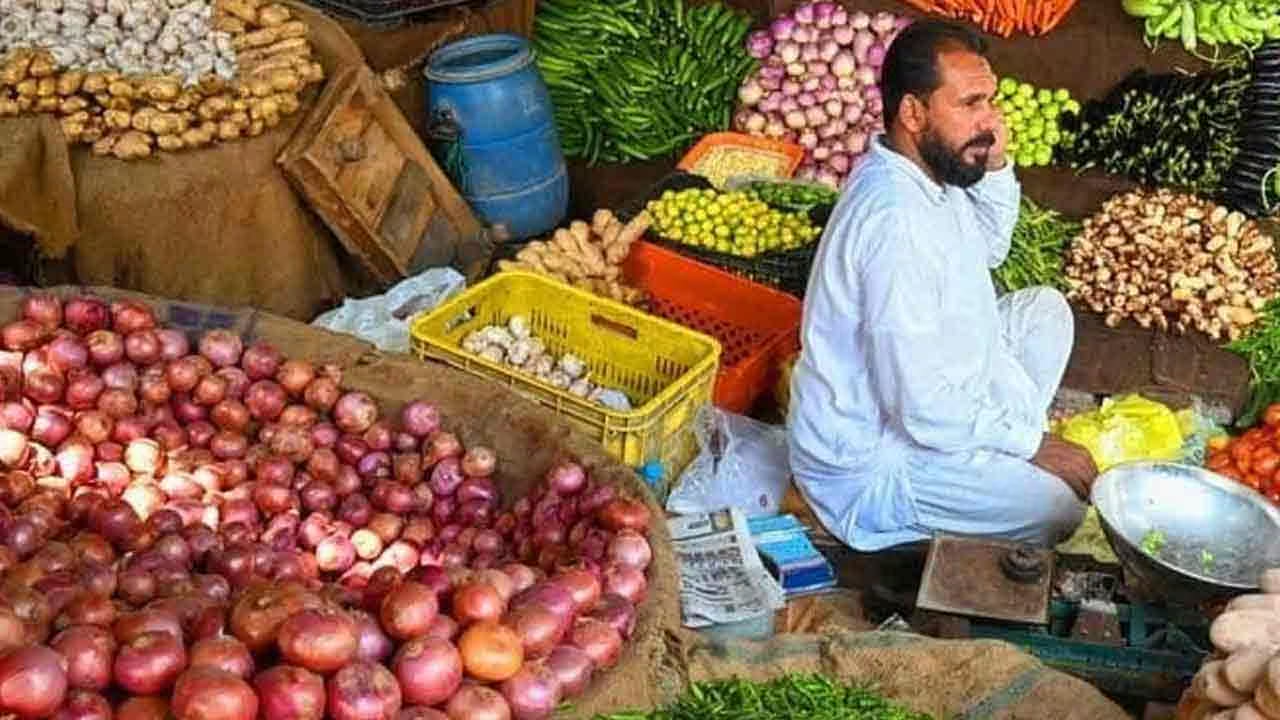The recent hike in the prices of vegetables and fruits in Pakistan has left citizens grappling with an ever-widening gap between their income and the cost of essential food items. According to the latest official rate list, the prices of 13 vegetables have seen a significant increase, causing widespread concern among the public. Despite the official prices, the actual market rates have surged far beyond the reach of the average consumer, leading to frustration and a growing sense of helplessness.
Vegetable Prices Hit Record Highs
The official rate list reflects an alarming rise in the prices of essential vegetables. For instance, onions, a staple in Pakistani households, are being sold at an unprecedented Rs 180 per kilogram in the open market. Similarly, garlic imported from China is priced at Rs 600 per kilogram, while ginger has reached a staggering Rs 720 per kilogram. Green chilies, another commonly used vegetable in Pakistani cuisine, are being sold at Rs 160 per kilogram, and lemons are fetching up to Rs 700 per kilogram.
Other vegetables have also seen steep price hikes. Potatoes, a versatile and essential ingredient in many dishes, are being sold at Rs 130 per kilogram. Bitter gourd, a popular vegetable in the summer, is priced at Rs 150 per kilogram, while turnips are available at Rs 200 per kilogram. Okra is being sold at Rs 160 per kilogram, capsicum at Rs 320 per kilogram, and arvi at Rs 250 per kilogram. Peas, which are often considered a luxury vegetable, are priced at Rs 440 per kilogram, while carrots are available at Rs 140 per kilogram.
Fruit Prices Skyrocket
The price hikes are not limited to vegetables alone. The cost of fruits, which are essential for a balanced diet, has also seen a significant surge. Potatoes, a common fruit in many households, are now being sold at Rs 400 per kilogram. Mangoes, the king of fruits and a favorite among Pakistanis, are priced at Rs 360 per kilogram, while papayas are available at Rs 350 per kilogram.
Citizens Struggle to Cope with Rising Prices
The surge in prices has left many citizens struggling to make ends meet. The disconnect between the official rate list and the actual market prices has only added to their woes. Despite the government’s efforts to regulate prices, the implementation of official rates in the market seems to be a distant dream. The unchecked rise in prices has placed a significant burden on the average consumer, who is finding it increasingly difficult to afford even the most basic food items.
Citizens have expressed their frustration, stating that the prices of vegetables and fruits have spiraled out of control. “It has become impossible to maintain a balanced diet with these soaring prices,” said one resident. “Even the most basic vegetables like onions and potatoes are now a luxury for many households. The government needs to take immediate action to control these prices before it becomes impossible for us to feed our families.”
Impact on Household Budgets
The rising prices of vegetables and fruits have forced many households to cut back on their consumption of these essential food items. For a country where a significant portion of the population already lives below the poverty line, this price hike has further exacerbated the financial strain on families. Many households have resorted to buying fewer vegetables and fruits, opting for cheaper, less nutritious alternatives to stretch their budgets.
The situation is particularly dire for daily wage earners and low-income families who are already struggling to make ends meet. The rising food prices have not only affected their ability to afford nutritious food but have also led to increased anxiety and stress as they try to navigate this challenging economic environment.
Calls for Government Intervention
The public outcry over the rising prices has led to calls for immediate government intervention. Citizens are urging the government to take stricter measures to regulate market prices and ensure that the official rate list is implemented effectively. There is also a demand for increased monitoring of market practices to prevent price gouging and hoarding, which are contributing factors to the inflated prices.
Economists and food security experts have also voiced their concerns, warning that the continuous rise in food prices could lead to a severe food crisis if not addressed promptly. They have called on the government to increase subsidies for essential food items and to implement targeted measures to support low-income families during this period of high inflation.
The skyrocketing prices of vegetables and fruits in Pakistan have left many citizens struggling to afford basic necessities. The disconnect between official rate lists and actual market prices has only deepened the financial burden on families, especially those in lower-income brackets. As the cost of living continues to rise, there is an urgent need for government intervention to regulate prices and ensure that essential food items remain accessible to all segments of society. Without immediate action, the situation could worsen, leading to increased food insecurity and further economic hardship for millions of Pakistanis.



